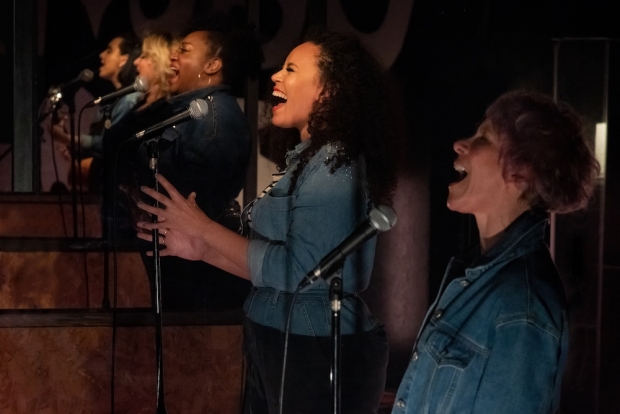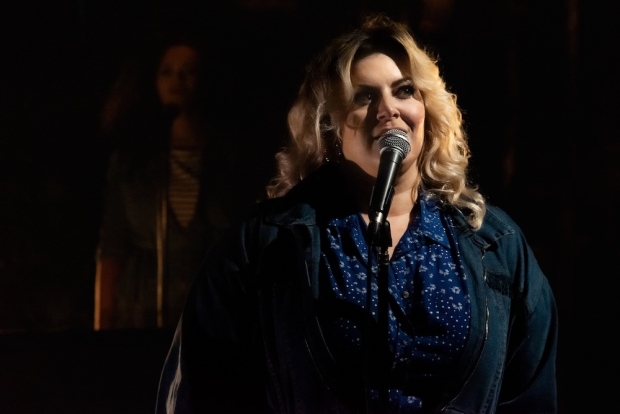Review: The Band Plays On (Sheffield Crucible, online)
Chris Bush’s new show tells a range of women’s stories

© Chris Saunders
Playwright Chris Bush has had a busy lockdown. Her Nine Lessons and Carols was one of the last
plays to perform to socially distanced audiences when it premiered at the Almeida; now The Band
Plays On marks the live-streamed and digitally-available return of the Sheffield Crucible to
performing life.
In many ways the two pieces have a lot in common. Both are essentially a sequence of monologues,
linked by a common theme, with musical interludes binding the parts together. In the case of The
Band Plays On, the theme is the resilience and interest of Sheffield itself, Bush's hometown – and
the strength and liveliness of five of its women residents, who each have a story to tell, a memory to
share.
Their segments are linked by five songs sung by the actors themselves and a live band, each part of
Sheffield's music heritage. A rousing version of the Arctic Monkeys' "I Bet That You Look Good on the
Dancefloor" kicks off the action, and "Beginners" (by Slow Club) closes it. The women, in dungarees
which they peel down to reveal different tops beneath, take it in turn to lead the singing – Jodie
Prenger's breathy version of "The Crying Game" is notably lovely. They are all terrific singers.
Robert Hastie and Anthony Lau direct the whole affair with admirable simplicity; there's a real sense of
letting the words animate the space and the words themselves are strong. Bush, who scored a huge
hit with the Sheffield-based musical Standing at the Sky's Edge, which was due to transfer to the
National Theatre before the pandemic spoiled all theatrical plans, is never less than an interesting
writer. She weaves fascinating links between things, turning her attention to small details in life that
other writers might overlook.
One of the monologues ties the bursting of Dale Dyke in 1864 to the terrible events at Hillsborough
football stadium which left 96 Liverpool fans dead. As she narrates both stories, Sandra Marvin,
whose character lives in the area, movingly makes the point that "it's not our tragedy" which is both
an obvious and an insightful observation: people living in a place where something terrible has
happened are marked by what it leaves behind, just as walls are etched with the height of the flood.

© Chris Saunders
Another story, told as she walks round the backstage of the theatre by Bush's regular collaborator
Maimuna Memon, links the 2012 Olympic heptathlon success of local hero Jessica Ennis-Hill with the
fact that the Sheffield Rules are the oldest football rules in existence, predating the FA by five years.
This brief history of the growth of the beautiful game – and a young woman's joy in it – contains the
immortal line: "There's only so much cricket a man can take before he has to invent a real sport
instead."
The earthy tang of that line shows Bush writing at her best; she has a great gift for the incisive
summary of feelings as well as the ability to trace a line from the past to the present. She does this
beautifully in Jocasta Almgill's section We're All Right, which draws the trajectory of political
idealism from Neil Kinnock's misplaced triumphalism at the disastrous Sheffield rally, thought to
have cost him the 1992 election, to the bitter scars of Brexit and latter-day xenophobia. Almgill
makes the political personal with great grace.
The weakest segment is the first, about a girl and her father linked by his decision to build a bunker
to protect them from the forthcoming Armageddon, which stubbornly resists Anna-Jane Casey's best
efforts to animate it; the simplest is the concluding Sanctuary, in which Jodie Prenger's heartfelt
storytelling packs a huge emotional punch. At the close, she tells us what unites these women: it
suddenly makes you feel the limitations of the monologue form. I long to see a play about the
interactions between these contrasting characters, just as I long to sit in the Crucible's intimate
arena once more.












